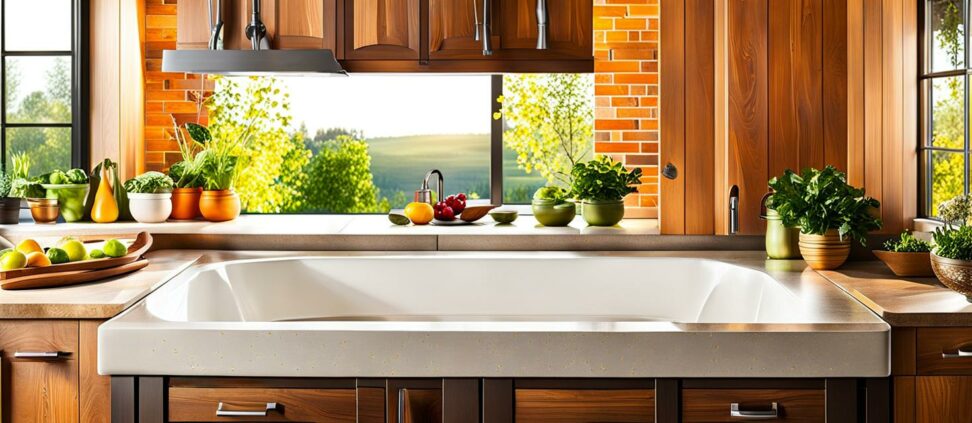Uncovering the Benefits and Drawbacks of Farmhouse Kitchen Sinks
With their vintage-inspired style and ample size, it's no wonder farmhouse sinks have become a top choice for today's kitchen upgrades. But before taking the plunge, it's important to weigh the unique pros and cons of these stylish sinks.
From material options to installation challenges, there are several key factors to consider with farmhouse sinks. Doing your homework upfront will ensure you make the best decision for your space.

What Makes Farmhouse Sinks Distinctive
Unlike standard kitchen sink models, farmhouse sinks are defined by several distinctive features that embody their old-fashioned style.
The exposed front apron is the signature trait of a farmhouse sink. This skirt-like panel hangs down to cover the cabinets, lending a nostalgic look. Farmhouse sinks also tend to be wider and deeper than regular sinks, offering enhanced functionality.
Many feature a double bowl configuration perfect for multitasking. From soaking dishes to washing produce, the dual basins maximize workflow.
Common Materials for Farmhouse Sinks
Farmhouse sinks come in a range of materials, each with their own pros and cons.
Stainless steel is affordable and easy to clean. However, it can be prone to scratches and dents over time.
Cast iron offers a classic appearance and retains heat well for tasks like filling pots. But it is very heavy and requires diligent care to maintain the finish.
Porcelain has an elegant glossy look and resists heat and stains. However, it is susceptible to chipping or cracking if improperly installed or handled roughly.
Copper is naturally antibacterial and forms a beautiful patina. But it is expensive upfront and requires frequent polishing.
Composite materials like acrylic or quartz are durable and quieter. But the finish is less attractive than other natural materials.
Key Benefits of Farmhouse Sink Styles
When weighing the pros and cons of farmhouse sinks, several benefits stand out that make them a popular choice.
The exposed apron front is a hallmark of farmhouse style, complementing today's renewed interest in farmhouse, cottage, and rustic decor. Its vintage look acts as a stylish focal point.
The increased depth and double bowl design also enhance functionality. There's more room for washing large pots and pans, and multitasking is easier than with single basin sinks.
Materials like enameled cast iron and composite materials offer enhanced durability and resistance to chips, cracks, and scratches compared to porcelain or stainless steel.
Potential Drawbacks to Evaluate
However, there are a few potential drawbacks to evaluate before choosing a farmhouse sink.
The large single basin and hard surfaces of materials like stainless and porcelain make farmhouse sinks prone to louder noise than other sink options.
Their unique design and larger size often necessitate professional installation and custom cabinet cutouts, unlike typical drop-in sinks.
Light colored porcelain in particular requires diligent sealing and maintenance to prevent staining from foods and liquids which can permanently set.
Finally, expect to pay $100-500+ more than a basic stainless steel sink. Factor in potential custom cabinetry work, countertop modifications, and pro installation.
Key Questions to Consider Before Buying
Doing your research before purchasing a farmhouse sink is advised. Keep the following questions in mind:
- Does a farmhouse sink fit with your current kitchen decor? The style works best in rustic, farmhouse, or cottage-inspired spaces.
- Which material makes the most sense for your lifestyle? Consider maintenance requirements and durability.
- Can your existing cabinetry easily accommodate a farmhouse sink or will custom work be needed?
- Will potential noise be an issue in your kitchen setup and materials?
- Are you prepared to properly seal, clean, and maintain the sink to prevent stains and damage?
Farmhouse sinks offer stylish vintage flair and enhanced functionality, but require some maintenance and upfront investment. Carefully weigh the pros and cons against your kitchen space, lifestyle and budget to decide if one is right for your next remodel.
While a farmhouse sink can elevate your kitchen's style and workflow, it may not be ideal for every situation. By thoroughly evaluating the considerations covered here first, you can make the most informed choice for your home.